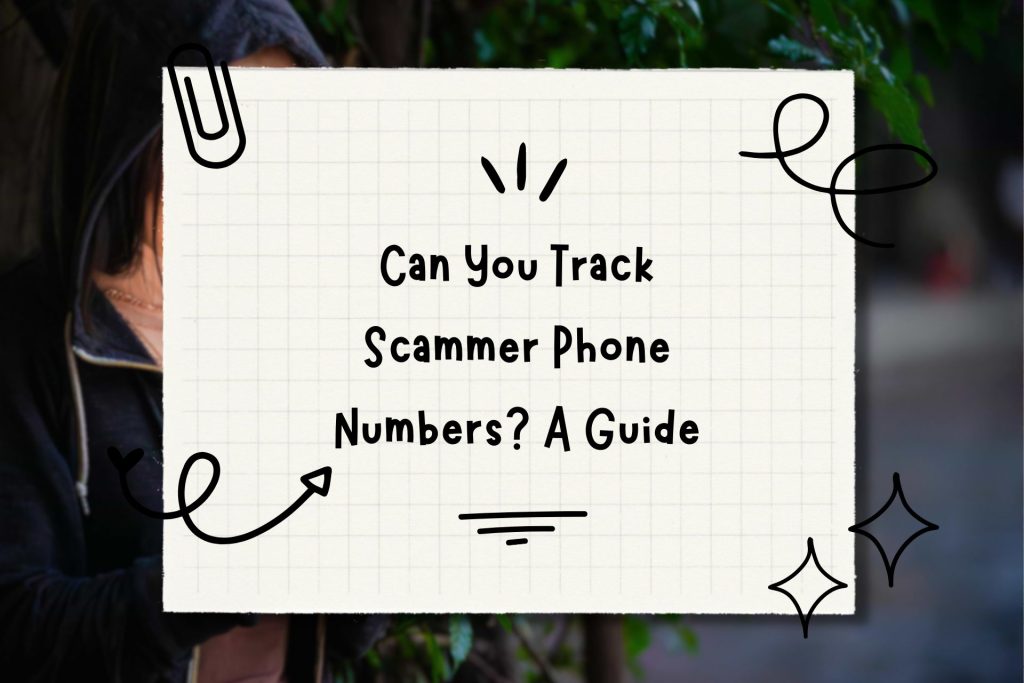Scammers can be a real pain in the neck, especially when they get a hold of your phone number. But what can you do when you receive a call from a scammer? Is it possible to track down their phone number? The answer is yes, but it’s not always easy.
Finding a scammer’s phone number can be challenging, but there are methods to aid in the process.
One approach is to utilize a reverse phone lookup service, which enables you to input a phone number and obtain details about the owner, such as their name, address, and additional contact information.
Notable reverse phone lookup services include PeopleLooker and Spokeo.
Another way to track down a scammer’s phone number is to report the scam to the Federal Trade Commission (FTC). The FTC is responsible for investigating and prosecuting scammers, and they have a number of resources available to help you track down the source of the scam. You can file a complaint with the FTC online or by phone, and they will investigate the matter and take appropriate action if necessary.
Although it is possible to track down a scammer’s phone number, it can be a difficult and time-consuming process. However, by using the resources available to you and taking the necessary steps to protect yourself, you can avoid falling victim to scams and keep your personal information safe.
What Are Phone Scams?

Phone scams are a common way for scammers to steal personal information, money, or both. Scammers often use phone calls to trick people into giving away sensitive information or making payments to them.
They can use various tactics to make their calls seem legitimate, such as spoofing caller ID or pretending to be a government agency, a bank, or a well-known company.
One common phone scam is the “tech support” scam. In this scam, a caller pretends to be a tech support representative from a well-known company, such as Microsoft or Apple.
They claim that the person’s computer has a virus or other problem and offer to fix it remotely for a fee. In reality, they are trying to gain access to the person’s computer and steal their personal information.
Another common phone scam is the “IRS” scam. In this scam, a caller pretends to be from the IRS and claims that the person owes back taxes. They threaten legal action or arrest if the person does not make an immediate payment. In reality, the IRS would never call someone to demand payment over the phone.
To avoid falling victim to phone scams, it is important to be cautious and skeptical of unsolicited calls. Do not give out personal information or make payments over the phone unless you are absolutely certain that the call is legitimate.
If you receive a suspicious call, hang up and report it to the Federal Trade Commission (FTC) or the appropriate authorities.
Legal Framework for Tracking Scammers
When it comes to tracking scammers, there are certain laws and regulations that must be followed to ensure that the process is legal. Additionally, there are limitations and privacy concerns that must be taken into account.
Laws and Regulations
There are several laws and regulations in place to govern the tracking of scammers. For instance, the Federal Trade Commission (FTC) provides guidelines for consumers who have been scammed. The guidelines state that consumers should report the scam to the FTC, which will then investigate the matter. In addition, the FTC has the authority to bring legal action against scammers who violate the law.
Another law that governs the tracking of scammers is the Electronic Communications Privacy Act (ECPA). The ECPA regulates the interception of electronic communications, including phone calls and emails. Under the ECPA, it is illegal to intercept electronic communications without the consent of at least one party involved in the communication.
Limitations and Privacy Concerns
While there are laws in place to govern the tracking of scammers, there are also limitations and privacy concerns that must be taken into account. For example, it can be difficult to track scammers who use untraceable phone numbers or who operate from foreign countries. Additionally, tracking scammers can sometimes involve accessing private information, which raises privacy concerns.
To address these limitations and privacy concerns, it is important to work with law enforcement agencies and other organizations that are authorized to track scammers. These organizations have the expertise and resources needed to track scammers while also protecting the privacy of individuals involved in the investigation.
Overall, tracking scammers can be a complex process that requires knowledge of the legal framework governing the practice. By working with authorized organizations and following the laws and regulations in place, it is possible to track scammers while also protecting the privacy of individuals involved in the investigation.
Methods to Track Scammer Phone Numbers
When it comes to tracking down a scammer’s phone number, there are several methods available. Here are some of the most effective ways to do so:
1. Reverse Phone Lookup Services
Reverse phone lookup services can help you identify the owner of a phone number by searching through their database of phone numbers. Some popular reverse phone lookup services include PeopleLooker, Spokeo, and Whitepages. These services can provide you with the name, address, and other information associated with a phone number.
2. Caller ID and Spam Blocker Apps
Caller ID and spam blocker apps can help you identify and block unwanted calls from scammers. These apps use a database of known scam numbers to alert you when a call is coming from a suspicious number. Some popular apps include Truecaller, Hiya, and RoboKiller.
3. Law Enforcement Assistance
If you have been scammed, you can contact your local law enforcement agency to report the incident. They may be able to help you track down the scammer’s phone number and other identifying information. Additionally, you can file a complaint with the Federal Trade Commission (FTC) by forwarding any scam, spam, or phishing text messages to 7726 (SPAM) on your cell phone.
Although these methods can be effective in tracking down a scammer’s phone number, it’s important to remember that scammers are often skilled at hiding their identity.
It’s always best to be cautious when receiving calls or messages from unknown numbers, and to never give out personal information unless you are certain of the caller’s identity.
Preventive Measures Against Phone Scams
Phone scams are becoming more sophisticated, and it’s essential to take preventive measures to avoid falling victim to them. Here are some steps you can take to protect yourself from phone scams.
Recognizing Scam Calls
The first step in preventing phone scams is to recognize them. Scammers use various tactics to trick people into giving them money or personal information. For example, they might pretend to be from a government agency, a bank, or a tech support company. They might ask for payment in gift cards or wire transfers, or they might threaten you with legal action or arrest if you don’t comply.
To recognize scam calls, look out for these red flags:
- The caller asks for personal information, such as your Social Security number or bank account details.
- The caller demands immediate payment or threatens you with legal action or arrest.
- The caller claims to be from a government agency or a well-known company but asks you to pay with gift cards or wire transfers.
- The caller offers you a prize or a grant but asks for an upfront fee.
Blocking Unwanted Calls
Once you recognize a scam call, the best course of action is to block the number. Most smartphones have a feature that allows you to block unwanted calls. You can also download third-party apps that offer more advanced call blocking features.
To block unwanted calls on an iPhone:
- Go to the Phone app and tap on the “Recents” tab.
- Find the number you want to block and tap on the “i” icon next to it.
- Scroll down and tap on “Block this Caller.”
To block unwanted calls on an Android phone:
- Open the Phone app and go to the “Recents” tab.
- Find the number you want to block and tap on it.
- Tap on the three-dot menu icon in the upper right corner and select “Block number.”
Reporting Scam Numbers
If you receive a scam call, you can report the number to the Federal Trade Commission (FTC) or the Federal Communications Commission (FCC). Reporting scam numbers helps authorities track down scammers and prevent them from victimizing others.
To report a scam number to the FTC:
- Go to the FTC’s Complaint Assistant website.
- Select “Telephone” as the product or service.
- Provide the requested information about the call, including the phone number and the nature of the scam.
To report a scam number to the FCC:
- Go to the FCC’s Consumer Complaint Center website.
- Select “Unwanted Calls” as the issue.
- Provide the requested information about the call, including the phone number and the nature of the scam.
By taking these preventive measures, you can protect yourself from phone scams and help prevent scammers from victimizing others.
Challenges in Tracking Scam Phone Numbers
Tracking scam phone numbers can be a challenging task due to various reasons. Below are some of the challenges that investigators and law enforcement agencies face while tracking scam phone numbers.
Use of VoIP and Burner Phones
Scammers often use Voice over Internet Protocol (VoIP) technology to make calls. VoIP allows users to make calls using an internet connection instead of a traditional phone line. This makes it difficult to track the location of the caller as the call can be made from anywhere in the world. Additionally, scammers often use burner phones, which are prepaid mobile phones that can be discarded after use. This makes it difficult to track the phone number as it is not registered under the scammer’s name.
International Jurisdiction Issues
Scammers often operate from different countries, which can pose a challenge to investigators and law enforcement agencies. Different countries have different laws and regulations when it comes to tracking and prosecuting scammers. This can make it difficult to track the scammer and bring them to justice. Additionally, some countries may not have the resources or infrastructure to investigate and prosecute scammers, which can make it easier for scammers to operate without consequences.
Role of Telecom Providers
Telecom providers play a crucial role in tracking down scammers. They have access to the necessary tools and resources that can help identify the source of a scam call or message. In this section, we will explore the different ways in which telecom providers can assist in tracking down scammers.
Carrier Tools and Resources
Telecom providers have access to a range of tools and resources that can help track down scammers. For instance, they can use call detail records (CDRs) to identify the source of a call or message. CDRs contain information about the time, duration, and location of a call or message, which can be used to identify the source of a scam.
Telecom providers can also use network-based tools to identify and block scam calls and messages. For example, they can use robocall blocking tools to prevent scam calls from reaching their customers. These tools use machine learning algorithms to identify and block scam calls in real-time.
Cooperation with Authorities
Telecom providers also cooperate with authorities to track down scammers. They can provide law enforcement agencies with information about the source of a scam call or message. This can help authorities identify and prosecute scammers.
Telecom providers can also work with regulatory bodies to implement measures that can help prevent scam calls and messages. For example, they can work with the Federal Communications Commission (FCC) to implement new regulations that require telecom providers to implement call authentication technologies. These technologies can help prevent spoofed calls, which are a common tactic used by scammers.
To sum up, telecom providers wield significant influence in the pursuit of scammers. Equipped with a plethora of tools and resources, they can aid in pinpointing the origins of scam calls or messages. Additionally, telecom providers can collaborate with authorities and regulatory entities to institute measures aimed at thwarting scam calls and messages.





